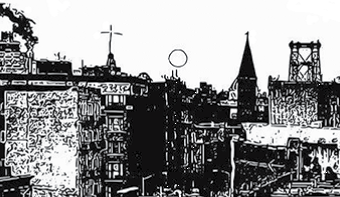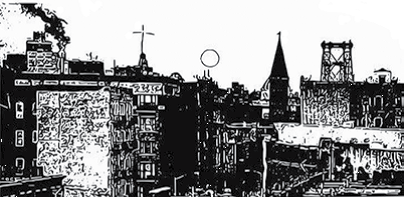by Luis Quiros
When a disaster of any kind arises, it’s so easy to be caught in the moment, the incident, the crisis, certainly in a time of information overflow, and miss the historical testimony that shows the impact has always been disproportionate. If we did, we would have a stronger and collective sentiment of “never again” and truly be “in this together”.
Speaking of the information overflow, the very phrase “We’re all in this together” is hard to swallow and feel disingenuous for those of us whose experiences have always been Othered.[1]
I live in Williamsburg Brooklyn, the part that is called Los Sures. As I’ve grown
up, Latinos decreased in population, and whites began to take over, some of
the best Spanish restaurants and stores turned into Condos and parking lots.
Change is inevitable but this change called gentrification killed a way of life.
Culture was destroyed, people were relocated, and the ones who stayed had no
choice but to adapt and continue to work harder to survive.
Graphic and narrative: Sandra Cruz – South Fifth Street
From the day Trump took office to the present crisis brought about by the Corona-virus, the year 2008, an economic shameful time for us, has often been baselined in attempts to maximize the benefits of the Trump era. This nation’s perception as being a land of opportunity consistently demonstrates that no matter how many services or rights there may be, if one does not have access to them they don’t exist at all.
Since its colonial authors the United States has been unwilling to use the favored group, aka Non-Others, as an equal protection baseline and unwilling to require states to justify allowing the poor to fall below that baseline.[2] Its’ reality; we have never and will never be into this together. Listen to the podcast that commences with, what is wrong with this picture?[3]
The journey from a transplanted monarchy to the hopeful enactment of a democracy required honorable and critical reflections attached to the consequences for enjoying, either or both, negative and positive rights since they live in conflict with each other. Negative rights, for example, demand abstaining from interfering with one’s actions or shot at autonomy. On the other hand, positive rights require contracts with specialists for access to services, such as health, education and welfare. Since these services are defined by state courts it should become obvious why those of us viewed as the Other’s lose to bad policy advocated by the more powerful, lobbies.[4] These conflicts are minimized for the wealthy and powerful who venture into the private sphere.
A historical narrative that mirrors the disaster we’re confronted with at the moment, are the events between May 2 and 4, 2008, when the world was reminded of mother nature’s power over us when Cyclone Nargis swept across southern Myanmar, formally Burma, claiming thousands of lives, damaging hundreds of thousands of homes, and affecting more than 2.4 million people in Yangon and the Ayeyarwady delta.
I contrasted the results of Myanmar’s military rule that denied aid to 1.5 million people facing the threat of starvation and disease with that of this nation. The more I heard about the difficulty in getting aid to the victims of the cyclone, the more I thought that this nation.
The 2008 victims in Myanmar and the 2008 – 2020 those from the United States were similar. For those Othered communities generations short of social services (Note: a mainstay of Bernie Sanders’ social position) it truly does not matter if those that hold the power wear a suit, a tie or a military uniform. The use of power and distribution of all resources in both Myanmar and the United States are equal in affect.[5]
Establishing a society in which we’re unified and protected means approaching our lives and our collective actions through a community lens, and educational system that recognizes we are all Others and believe it.
Luis Quiros, M.P.A., M.S.W.
Author of An Other’s Mind (2011) and Justice Unplugged (2020)
About the Author: Luis Quiros learned early in life the value of forming a strong partnership between “street smarts” and scholarship. Quiros used this partnership to expose historical and sociological myths, as well as how fiscal policies and systems have plagued and affected the lives of those viewed as Others. Within classrooms and through writing and social commentary, Quiros goes beyond the research and captures narratives with a mentoring and community-building intention. Through his roles within non-profit and proprietary institutions, Quiros has brought expertise to challenge levels of service models that measure impact and how diversity and inclusion are defined.
[1] Quiros, Luis. An Other’s Mind. AuthorHouse, Bloomington, IN. 2011.
[2] Excerpt: Neuborne, State Constitution and the Evolution of Positive Rights, 20 Rutgers L.J. 893 (1988-1989) (collecting state constitution “poverty” provisions);
[3] www.anothersmind.com. Episode 1; 12/28/2015; https://www.dropbox.com/s/pzkil83v6by49b6/Episode%201%2012-28-15.mp3?dl=0
[4] Quiros, Luis; Justice Unplugged, p. 14.
[5] Quiros, Luis; An Other’s Mind, Authorhouse, 2010, p. 233-5.


Are we really “In This Together”? by Luis Quiros, M.P.A., M.S.W. poses a question connecting us all. At what better time to reflect and be honest as Mr. Quiros mentions, “When a disaster of any kind arises, it’s so easy to be caught in the moment, the incident, the crisis, certainly in a time of information overflow, and miss the historical testimony that shows the impact has always been disproportionate.”
Here we are as United States citizens facing our current disaster that connects us all. Covid-19. A Pandemic that leaves death and sorrow. As it unfolds we are being educated on how this epidemic targets more African Americans and Latinos than whites. Depending on who you ask will give a different response. For example, if you ask a person of color with no knowledge of history, this question compared to those who are well informed, the response will be as Mr. Quiros described it as “Othered” or different. My response as a person of color will be from a perspective from the later.
“This nation’s perception as being a land of opportunity consistently demonstrates that no matter how many services or rights there may be, if one does not have access to them they don’t exist at all.” To answer this question one word comes to mind. Disparity. How can social economics, health care, wages, redlining and “Gentrifying,” not be considered in, “Are we really ‘In This Together”? That’s where you will find the answer. In Mr. Quiro’s book, “Justice Unplugged”. He breaks down the multi-levels of disparity that affects black and brown people. It suggests from a historical point of view to the current time. No. We Are Not In This Together.”
Mr. Quiro’s observation due to his experience and knowledge of growing up in West Harlem is invaluable. He’s an activist, community organizer, and scholar. Luis holds a Master’s degree in both Public Administration focused on urban economics and Social Work with a concentration in community organizing, planning, and administration. His qualifications speak for itself. He walked the walk and can talk the talk.